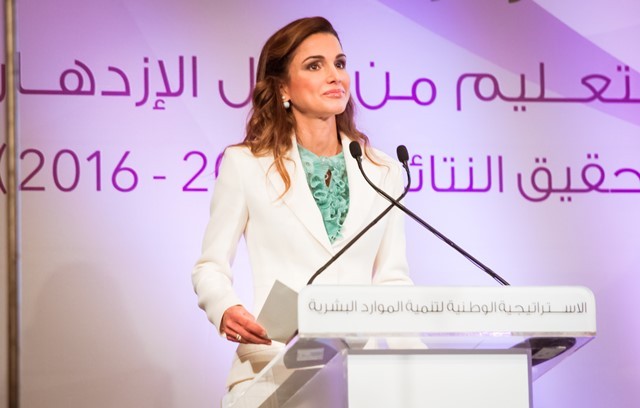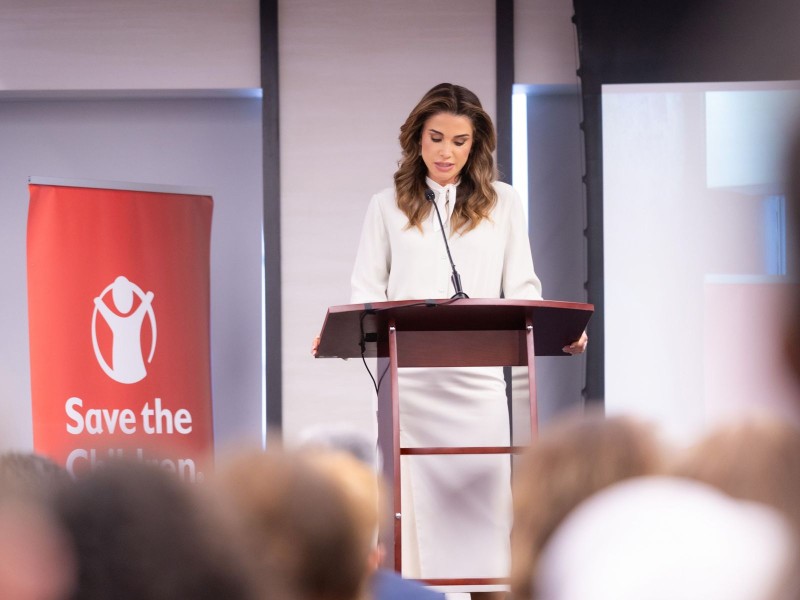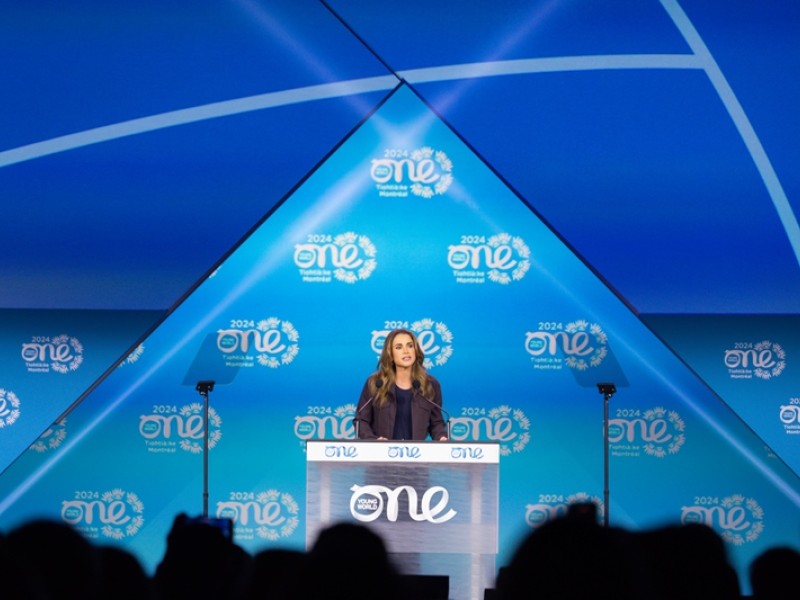Queen Rania's Speech at the National Strategy for Human Resource Development Conference

In the Name of God, the Almighty and Merciful
Assalamu Aleikum Wa Rahmatullahi wa Barakatoh (May Allah’s Peace, Mercy and Blessings Be Upon You)
Your Majesty, distinguished guests,
We are here today to discuss education; an often fiercely debated issue, except when it comes to its importance, which is never disputed… Because education touches every Jordanian household; each of us has a son or a daughter, a grandson or a granddaughter, a dear child or a relative, who goes to school every day.
We meet for their sake, not for the sake apportioning blame. The challenges our education system faces are numerous and complex; no one side is solely responsible for the problem, yet all of us have a responsibility to solve it.
Your Majesty,
The most important lesson you taught us is that the shortest way to resolve problems is to confront, not ignore, them. You taught us to see things as they are, because downplaying challenges will come at the expense of Jordan's future generations, and that is something you would never accept. You constantly challenge us to raise our heads high so we don’t lose sight of the opportunities that are often hidden among challenges.
I realize that our current reality is difficult, and our surroundings more so. Still, I have great hope and great faith that we can turn the course of our history… Not through revolutions, aid, or the discovery of natural resources or even a buried treasure many dream of. The real treasure is all around us: there is no need to dig or search; it is in the minds of our children, and all we have to do is extract it.
Fortunately, today, talent is the most valuable commodity in the world. Knowledge, innovation, and technology are key ingredients to the success of any country, and we are no exception. Success is within our reach if we invest in education today, not tomorrow –because the only thing that stands between our present, and the future we aspire to, is ourselves.
Let us take the first step on the shortest path and examine our educational system with a critical eye. One hundred and fifty thousand children are enrolled in the first grade every year. What do we offer them? What does their journey within our education system look like?
Ninety percent of the development of the human brain occurs before the age of five, and yet in Jordan, only a small percentage of students have access to early childhood education: just two percent under the age of three, and roughly twenty-eight percent between the ages of three and five. One the other hand, the enrollment rates of their peers in the Organization for Economic Cooperation and Development (OECD) countries are multiples times higher.
Then comes their first day in primary school, a day of both anxiety and anticipation for children. Their parents encourage them, saying, "Those who don’t attend school will not learn, and “what will you be when you grow up if you don’t go to school?"
After the child trusts his parents’ reasoning, and the parents trust that their child, their most precious asset - and ours- will receive an education that fulfills their ambitions, the child carries his schoolbag, pens and notebooks and begins the primary school journey.
Gradually, lofty ambitions begin to fade in the face of the quality of education. Studies show that eighty percent of the second and third grade primary students underperform in reading… and that elementary school students in Jordan are falling behind in mathematics.
We get to the eighth grade, and we see that instead of improving, Jordan's ranking has deteriorated in the last two cycles in the TIMSS International Mathematics and Science Assessment.
Then, in the tenth grade, we find Jordan ranking among the bottom ten countries in the Programme for International Student Assessment (PISA) on a list of fifty-six states.
As for the General Secondary Certificate (Tawjihi), despite efforts to improve it and elevate its status, the outcome remains unsatisfactory. Last year one hundred thousand students entered twelfth grade. Only sixty thousand of them sat for the secondary certificate exam, of whom only forty percent passed. This means that for every four students in the twelfth grade, less than one will graduate! And this year’s results reflected a similar pattern.
Every year we are shocked by news headlines like: "Not a single student from three hundred schools has passed!” I want to share with you an incident which I don’t like to remember but it is one that we should never forget. An empty Tawjihi exam paper was submitted with only this comment written on it by the examination hall supervisor: “the student is illiterate; he cannot read or write!”
A student spent twelve years in our schools and did not learn how to read and write!
Education reform is not easy, and it demands an unprecedented effort, in order to achieve unprecedented results. We must rethink structural issues such as education management, and introduce policies that bring highly qualified teachers into the teaching profession, and maintain their level of competence. Of equal importance are issues such as accountability and taking responsibility for poor educational outcomes.
Yes, the figures are shocking but, unfortunately, they make sense. What can we expect if less than ten percent of the Ministry of Education’s budget is allocated to the development of the educational process, compared to forty percent in a country like Finland?
What can we expect if fifty percent of our teachers chose this profession simply because it was the best or only available option to them?
What can we expect if only one-third of teachers in Jordan have specialized in education? The rest are leading classrooms today with degrees in science, mathematics or Arabic, but without any significant training in teaching methodologies.
We always say that teachers are the focal point of the educational process, but we have yet to make teachers the focal point of our attention. We place a burden of heavy responsibilities on them, without giving enough support to carry it. Despite that, we find them making every effort in the classroom for the sake of their students.
How can we expect our children to excel in today’s world if we don’t equip them with new technologies and access to the Internet from an early age? There are hundreds of schools in Jordan that aren’t connected to the Internet. Those that are, suffer weak connections and slow speed. That is why we are optimistic about efforts underway to complete the fiber optic network in the Kingdom, and insist on the importance of connecting all our schools.
We also cannot ignore the importance of what we teach our children. So, we must add our voices to the journalists and others who broke a taboo and spoke out on the need to reform a curriculum that has failed to produce graduates who have what it takes to succeed in the 21st century.
The goal of this presentation is not to push us into a dark hole without hope or light, or to describe an irreversible reality.
Change is difficult, but it’s not impossible. We have in our hands today a ten-year roadmap, which identifies the shortest and most effective paths to education reform. And here we are, moving forward. Our sincere gratitude to the National Committee for Human Resources Development for all their efforts.
Your Majesty, distinguished guests,
Jordan is not referred to as “the land of resolve” by chance. Rather, Jordanians have, over and again, shown that if they want to achieve something, they can. And we want quality education for our children; so let us start where we aspire to reach.
We want our children to work and compete in the 21st century; so let us equip our schools with technology and e-learning tools so that our students become fluent in the language of the century.
We want curricula that enrich learning and expand horizons of knowledge, so let us establish a curriculum center to implement the latest educational methods and curriculum development techniques - a model adopted by many top performing countries.
We want qualified teachers. That is why we are cooperating with the Ministry of Education, the University of Jordan and the Teachers' Academy to establish a teacher education college to train teachers for one year before they enter the classroom. Only then can they lead their classrooms with confidence, equipped with the necessary knowledge and skills to teach Jordan's young generations.
We will work with one of the best teacher training colleges in the world because we want the best education for our children, and the best training for our teachers.
There is no shame in drawing on international expertise, or in attracting talent wherever it may be to expand our knowledge. In our fast-changing world, there is no time to reinvent the wheel. Let us learn from those who have succeeded, and let us import the right expertise and capitalize on it. Let us use those foundations to build strong Jordanian institutions that are able to nurture generations with a global outlook and a strong Jordanian identity.
When we want, we can. That is why the most critical change we need is to break the mental molds and age-old limitations that have made our education system stagnant, rigid and incapable of keeping pace with changing times and growing ambitions. The toughest obstacles can only be overcome when we free ourselves from the high walls we have built within us, obscuring our vision and dreams.
The education we provide our children over the course of twelve years must be a journey that is worthy of their childhood, their time and their trust… A journey that begins with planting the seeds of life-long learning, so that they can grow with open and inquisitive minds.
Who here does not want that?
Education reform must be a national priority and a popular demand today, tomorrow and ten years from now.
In turn, our investments must mirror our priorities. Government spending on education must reflect the aspirations of Jordanians for quality education, so that we can take quick and confident strides towards the future we want, without fear or hesitation.
I have previously called for an education revolution, but Jordan cannot stand strong unless we all move together.
Ours is a country of strong institutions, and all of you here are decision-makers. Historical changes like the ones we’re are facing today require consensus and urgent unified action.
I hope that commitment to change today, does not morph into blame shifting tomorrow. Let me reiterate that we are not here today to throw blame, because that is a waste of time.
Your Majesty,
Distinguished Guests,
Let us fast forward ten years to the first week of school in 2026. We will find our children and grandchildren excited about going to schools that can realize their ambitions and ours.
We will see them greeted by teachers who are eager to provide them with knowledge, which they have worked hard to acquire and develop.
We will find their lessons alive with inquiry and self-expression. As for their curricula then, who knows what it will look like because with the constantly evolving education system we will develop, we won’t be able to predict today what our curricula will be a decade from now!
We will find Jordan ranking amongst the top ten countries in international assessments, and the day of Tawjihi results will be a day of national pride. It will be a day when one hundred and fifty thousand young men and women graduate feeling confident of their ability to find jobs they excel in and provide for their families.
What separates our reality now from that day, is consensus on education as a national priority, unwavering Jordanian resolve, and a commitment to a national strategy that can guide us out of this tunnel. Within the walls of this room and outside it, we have enough sense of responsibility, talent, and faith in education, to lead change and drive it forward. Let us commit and forge ahead towards an education system that meets ambitions of Jordan and its people.
May God bless you and may you, through your resolve, be an asset to the nation.
Walssalamu Aleikum Wa Rahmatullahi wa Barakatoh (May Allah’s Peace, Mercy and Blessings Be Upon You)
Featured
Queen Rania's official website
This website does not support old browsers. To view this website, Please upgrade your browser to IE 9 or greater
Your browser is out of date. It has known security flaws and may not display all features of this and other websites. Learn how to update your browser



